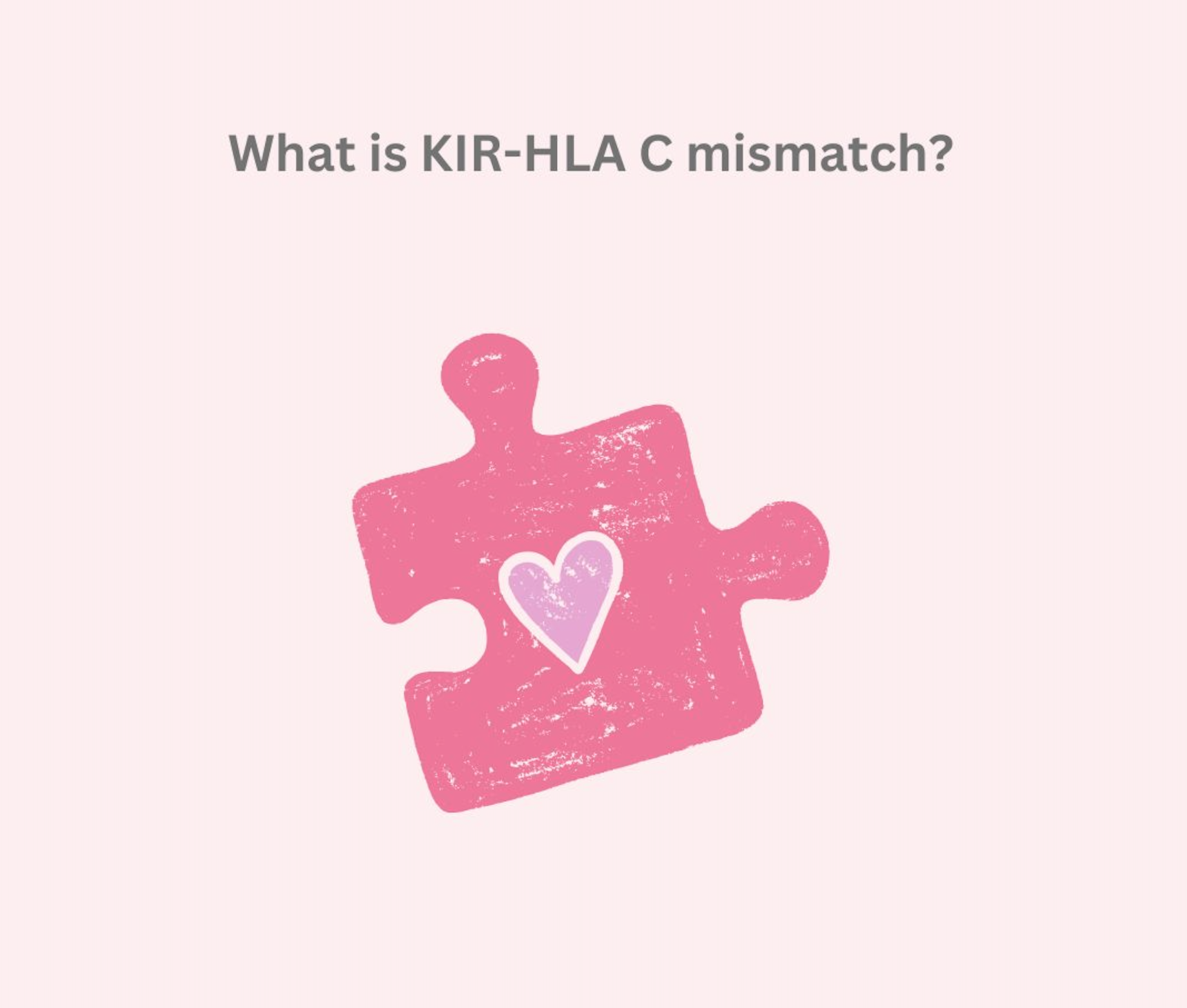
Alloimmunity Dysfunction.
Maternal-fetal immune incompatibility
In a healthy pregnancy, the mother's immune system undergoes a special adaptation process allowing it to protect the fetus through developing an active immunological tolerance. This is necessary since the genetic disparity between the mother and the fetus could trigger its immunological rejection. Active immunological tolerance involves the mother's immune system successfully identifying the embryo and adapting its presence, in order to prevent its rejection. Additionally, it actively promotes essential processes for implantation and maintaining the pregnancy. However, when there is a dysregulation or imbalance in the mother's immune system, it can compromise the successful implantation and development of the embryo.
FERTILYSIS Reproductive Alloimmunity
1150€

Blood Draw

No doctor's referral

Peripheral Blood

Storage & Shipping at ambient temperature

Results in 20 business days
Time matters! FastTrack Results.

Your time matters because your journey should always be a priority, every step of the way.
Fertilysis FastTrack Results stand as a commitment to remove barriers and redefine timelines. Get your test results in 5 working days expedited, from the day your sample reaches us, instead of the standard processing time.
290€
WE GOT YOU.
The initial step in a successful pregnancy involves the recognition of the embryo, which, being genetically distinct from the mother, necessitates the adaptation of the maternal body to accommodate and create an immunologically privileged environment for the fetus. This transformation establishes active immunological tolerance, shielding the embryo from the maternal immune system. Fetal recognition relies, in part, on identifying paternal HLA markers on embryo cells. However, challenges may arise if partners share common HLA variants (HLA matching or sharing), creating potential difficulties in recognition. "Maternal-fetal immune incompatibility" occurs when the mother and father have similar HLA-DQa alleles, potentially triggering an immune response that hinders implantation or leads to early pregnancy loss. As counterintuitive it may seem, studies suggest that fetuses with HLA haplotypes similar to their mothers' are more likely to be aborted. It seems that the paternally-derived genetic diversity is essential for embryo recognition and initiation of active immunological tolerance by the mother.
T-regulatory cells (Tregs) & uterine NK (uNK) cells:
At the same time, for the pregnancy to initiate and progress, the mother’s regulatory T (Tregs) immune suppressive cells and her uterine natural killer cells (uNKs) are required to help regulate the local uterine immunity and prevent rejection of the embryo. Tregs are essential mediators of the immune tolerance required to initiate pregnancy. It has been suggested that inadequate levels of Tregs may fail to effectively suppress pro-inflammatory responses, compromising the embryo's ability to avoid maternal immune rejection. Low toxicity uNK cells contribute to implantation, vascular modification and placentation. The activation of uNKs is facilitated by killer immunoglobulin-like receptors (KIRs) on their surface, which interact with fetal HLA proteins, expressed by the embryo. The balance between activating and inhibitory KIRs determines the activation or inhibition of uNK cells, crucial for successful pregnancy outcomes. Women with a genetic KIR-HLA-C mismatch characterized by maternal lack of activating KIRs in conjunction with embryo HLA-C2 presence, may face increased risk of uNK cell inactivation, leading to implantation failure, recurrent miscarriage, and serious pregnancy complications. Defective placentation, pre-eclampsia, fetal growth restriction, stillbirth and recurrent spontaneous abortion are associated with higher frequencies of inhibitory KIRs in women.
The FERTILYSIS Reproductive Alloimmunity panel involves 3 main tests:
HLA DQα matching between partners
KIR - HLA-C mismatch
Leukocyte Antibody Detection Panel (LAD)

HLA DQα-1 partner matching
In a healthy pregnancy, the mother's immune system adapts to accept the fetus through active immunological tolerance. This process involves the identification of at least a minimum level of genetic diversity from the father, including diverse human leukocyte antigen (HLA) genes. Studies suggest that fetuses with HLA haplotypes similar to the mother's are more likely to be aborted. Through this test we can predict possible embryo HLA combination and compare to the mother for compatibility.
KIR-HLA-C mismatch
To maintain tolerance, Immune suppressive regulatory T cells (Tregs) and uterine natural killer cells (uNKs) need to regulate the local uterine immunity and prevent rejection of the embryo. The activation of uNKs is facilitated by killer immunoglobulin-like receptors (KIRs), which interact with fetal HLAs. The balance between activating and inhibitory KIRs determines the activation or inhibition of NK cells, crucial for successful pregnancy outcomes. Defective placentation, pre-eclampsia, fetal growth restriction, and recurrent spontaneous abortion are associated with higher frequencies of inhibitory KIRs in women. Specific combinations of maternal KIR and paternal HLA-C genes may indicate a higher risk of infertility. This test allows genotyping of maternal KIR genes and comparison with possible fetal HLA genotypes to predict a possible mismatch.


Lymphocyte Antibody Detection (LAD)
It is a specialized infertility test aimed at assessing immune compatibility between partners. This test is particularly relevant in cases where there are recurrent pregnancy losses or unexplained infertility. During LAD testing, the blood of the female partner is analyzed to detect the presence of antibodies that may react against her partner's lymphocytes. The rationale behind this test is based on the concept of immune-mediated infertility, where the female partner's immune system produces antibodies against the male partner's cells, as a measure of the levels of blocking antibodies and protective antibodies which need to be produced during pregnancy to stop maternal immunological response against the fetus. Overall, LAD interpretation and utility should be evaluated in conjunction with other clinical findings and diagnostic tests.
Maternal HLA-C testing
(Currently, it can be added as an additional single test so that it is included in the Reproductive Alloimmunity panel)
Until recently, fertility testing only looked at the mother’s KIR genes and the father’s HLA-C type. The mother’s HLA-C was not taken into consideration because it was thought to be a “background factor” with little impact.
But new evidence shows that’s not true. Uterine immune cells react to any HLA-C2 on the embryo — whether it comes from the father or the mother. This means a woman’s own HLA-C type can influence how her immune system interacts with the embryo, especially if she has the inhibitory KIR AA genotype.
By adding maternal HLA-C typing to the evaluation, we get the full picture of compatibility. This matters because:
- It identifies risks that other tests could miss
- It explains why some women experience implantation failure or miscarriage despite “normal” results
- It opens the door to personalized, immune-based treatments that can improve pregnancy outcomes
Including maternal HLA-C makes the test more accurate, more actionable, and more valuable for guiding treatment.

A couple may consider testing for reproductive immunology problems if they experience recurrent pregnancy losses, unexplained infertility despite regular attempts to conceive, or implantation failures in assisted reproductive technology (ART) cycles such as in vitro fertilization (IVF). Additionally, if either partner has a history of autoimmune disorders or immunological conditions, or if there are indications of immune system dysregulation, such as chronic inflammation or suspected immune-related reproductive issues, testing for reproductive immunology problems may be warranted.
• When you have a history of recurrent miscarriage and/or chemical pregnancies
• When you and your partner have been diagnosed with “unexplained infertility”
• If you experience primary or secondary infertility, naturally or through IVF with:
• When you have a history of unexplained pregnancy complications of the 2nd & 3rd trimesters such as:
At Fertilysis, we specialize in Reproductive Immunology. Based on your results, we can provide personalized recommendations and immunomodulatory treatments to optimize the chances of a successful pregnancy. By understanding the role of the immune system in maternal-fetal tolerance, interventions can be tailored to address specific immunological factors that may impact pregnancy outcomes.
Main Treatments:
Treatment for reproductive immunology problems typically require a healthcare professional specialized or well-versed in reproductive immunology and its specialized therapies. Each detected problem has its own recommended treatment(s) and each treatment is tailored to address specific immune system dysfunctions and optimize fertility outcomes. If you don’t have access to specialized treatment protocols then we will be able to provide protocols for the treatments we consider appropriate based on your Fertilysis results and your medical history following a specialized follow-up, on-line consultation with our specialist. However, even so, you will need to have a local healthcare professional who will be able to help implement and supervised said therapies included in our protocols and prescriptions.
Immunomodulatory therapies:
Infection/Microbiome testing:
Accessory Treatments:
Other treatments to help with reproductive immunology infertility-related problems may include a combination of medical interventions, lifestyle modifications, and dietary adjustments. Some potential treatments and lifestyle adjustments may include:
Dietary adjustments:
Lifestyle modifications:
Supplementation:
Stress reduction techniques:
FERTILYSIS Reproductive Alloimmunity
FERTILYSIS Reproductive FULL
HOW IT WORKS.

Place your order online and get the FERTILYSIS box delivered at your home.

Follow our instructions to collect your samples and ship them back to us for analysis.

Receive your easy to understand results including treatment suggestions in just a few days via email.
Is your infertility really ‘’unexplained’’ or are you still undiagnosed?If you have been struggling with infertility and haven’t been getting convincing answers, chances are you are still missing a piece of the puzzle.
SINGLE TESTS
HLA DQα matching between partners
390€
HLA-C (maternal)
220€
HLA-C (paternal)
220€
KIR-HLA C mismatch
850€
KIR typing
580€
STILL HAVE QUESTIONS?

These our the most common questions regarding this panel.
If you have more, please refer to our Q&A page.
Yes. The test requires both female and male peripheral blood samples.
Ideally, the gel tubes should be spun at room temperature at a speed of 1000 to 1300 RCF for 10 minutes in a swinging bucket centrifuge and 15 minutes in a fixed-angle centrifuge but anything close to that should be OK!/p>
Absolutely! Our tests are accessible worldwide, allowing you to conveniently perform them from the comfort of your home, regardless of your location. We ship worldwide!
Unfortunately, no!


